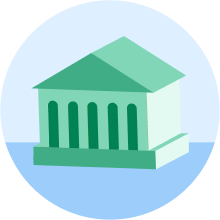What Is a Debt Consolidation Loan?
Many or all of the products featured here are from our partners who compensate us. This influences which products we write about and where and how the product appears on a page. However, this does not influence our evaluations. Our opinions are our own. Here is a list of our partners and here's how we make money.
A debt consolidation loan is a type of personal loan that you use to combine your existing debts into a single debt with one monthly payment.
Using a debt consolidation loan can reduce the total interest you owe and help you pay down debt faster. It can also simplify the payoff process, as you only have one monthly payment to account for in your budget.
Borrowers often use these loans to pay off high-interest credit cards, though you can use them to tackle other debt, too, like medical bills and payday loans.
» MORE: Best debt consolidation loans
on SoFi's website
on SoFi's website
How do debt consolidation loans help you pay off debt?
Debt consolidation loans help you pay off debt by giving you access to a lump sum that you can put toward your unsecured debts, like credit cards, so they're paid off. You then repay the debt consolidation loan in fixed monthly installments. Loan amounts usually range from $1,000 to $50,000 with repayment terms from two to seven years.
Let’s say you have four credit cards, each with a $5,000 balance. Instead of making monthly payments on each credit card, you take out a debt consolidation loan for $20,000 and use that money to pay off your credit cards. You’re then left with one monthly payment on your new loan.
Not sure if debt consolidation is right for you? Plug your existing debts into NerdWallet’s debt consolidation calculator to explore different options and see how much money you could potentially save by consolidating with a debt consolidation loan.
Pros and cons of debt consolidation loans
You pay less in interest.
You may get out of debt faster.
You have only one payment.
You have a clear finish line.
You may not qualify for a low enough rate.
You still have debt you need to manage.
Consolidation won't fix core spending issues.
Pros of debt consolidation loans
You pay less in interest: By getting a debt consolidation loan at a lower rate than your current debts, you’ll save money on interest, which can make your debt more manageable.
You may get out of debt faster: Because you’re saving money on interest, you can use that savings to make larger payments on your loan and get out of debt even faster.
You have only one payment: Unlike juggling multiple credit card bills, you’ll have only one monthly payment if you combine your debts under a consolidation loan.
You have a clear finish line: A debt consolidation loan gives you an exact date you’ll be debt-free, which can help you stay motivated as you make the payments.
Cons of debt consolidation loans
You may not qualify for a low enough rate: Not all consolidation loans come with low interest rates, and if you have bad credit (a score below 630), you may not get a rate that’s lower than your current debts.
You still have debt you need to manage: Consolidating debt is a smart choice for many, but it’s important to remember the debt doesn’t disappear — it goes somewhere else. Most debt consolidation loans offer terms of two to seven years, so be prepared to stick to your monthly payments over that time period.
Consolidation won’t fix core spending issues: If you’re in debt because you struggle to stick to your monthly budget, a debt consolidation loan won’t fix that. It may even make things worse if you use your newly freed credit cards to rack up additional debt.
Are debt consolidation loans a good idea?
Debt consolidation loans are usually a good idea if you can get one with a lower annual percentage rate than the rates on your existing debts, and you’re able to afford the monthly payment over the life of the loan.
Debt consolidation also works best if you've already kicked any negative spending habits. If you keep swiping your credit cards after you've consolidated and freed them up, your credit and finances could suffer.

Do debt consolidation loans hurt your credit score?
Like most forms of credit, a debt consolidation loan will impact your credit score when you apply and as you pay it off.
When you apply for a debt consolidation loan, lenders usually require a hard pull of your credit report, which can temporarily knock down your credit score a few points. And if you use the loans to pay off credit card debt but end up carrying large balances on those cards again while you pay off the loan, your utilization will rise and your score may suffer.
However, taking the loan and a short-term credit score dip might make sense if the loan gives you more manageable payments that you can make on time each month. Payment history accounts for over one-third of your credit score.
Using a debt consolidation loan to pay off revolving debt, like credit cards, can bring your credit utilization down, which may also improve your score.
What credit score is needed for a debt consolidation loan?
The availability and interest rates of debt consolidation loans largely depend on your credit score. The better your score, the more options you have and the lower interest you’ll likely pay. But there are loans available for borrowers across the credit spectrum.
Borrowers with good or excellent credit (690 credit score or higher) and low debt-to-income ratios usually qualify for the lowest rates on debt consolidation loans and have a wider range of lenders to choose from.
Borrowers with bad to fair credit (300 to 689 credit score) are viewed as riskier by lenders, but still may qualify for debt consolidation loans from online lenders that accept bad-credit borrowers.
» COMPARE: Best debt consolidation loans for bad credit
The best way to learn if you qualify for a debt consolidation loan is to go through the steps to pre-qualify. One of the benefits of the pre-qualification process is that it uses a soft credit pull and gives you a sense of the loans and rates available to you without hurting your credit score.
You can pre-qualify for free on NerdWallet and compare loans from online lenders.
How to get a debt consolidation loan
Make a list of all of your debts and monthly payments that you want to consolidate. Any debt consolidation loan you take on should be large enough to cover these debts, and the loan’s interest rate and monthly payment amount should be lower than what you’re currently paying.
Make sure the loan payment fits within your budget. A debt consolidation loan won’t be helpful if it ends up putting you further into debt.
Once you know your desired loan amount and interest rate, shop around and compare loans available to you. Check online lenders, banks and credit unions, each of which offer different benefits.
Where to get a debt consolidation loan



Other ways to consolidate your debt
Debt consolidation usually involves getting a loan, but other options include refinancing with a 0% interest balance transfer credit card, tapping into your home’s equity or using your 401(k) savings.
Zero-interest credit card
Refinancing your debt with a 0% interest balance transfer card can be useful for smaller debts that you can pay off during the card’s no-interest promotional period, which usually lasts 15 to 21 months. You’ll likely need good or excellent credit to qualify.
» MORE: How do 0% APR credit cards work?
Home equity financing
If you own a house, you could also borrow against your home's equity to pay off your debts. Home equity loans and home equity lines of credit may have low interest rates, but if you stop making payments, you could lose your home.
401(k) loan
Some people choose to take a loan from their employer-sponsored retirement account, known as a 401(k) loan. These loans usually have low interest rates, but borrowing from your 401(k) means you’ll miss out on the potential to grow your retirement savings.
on NerdWallet


